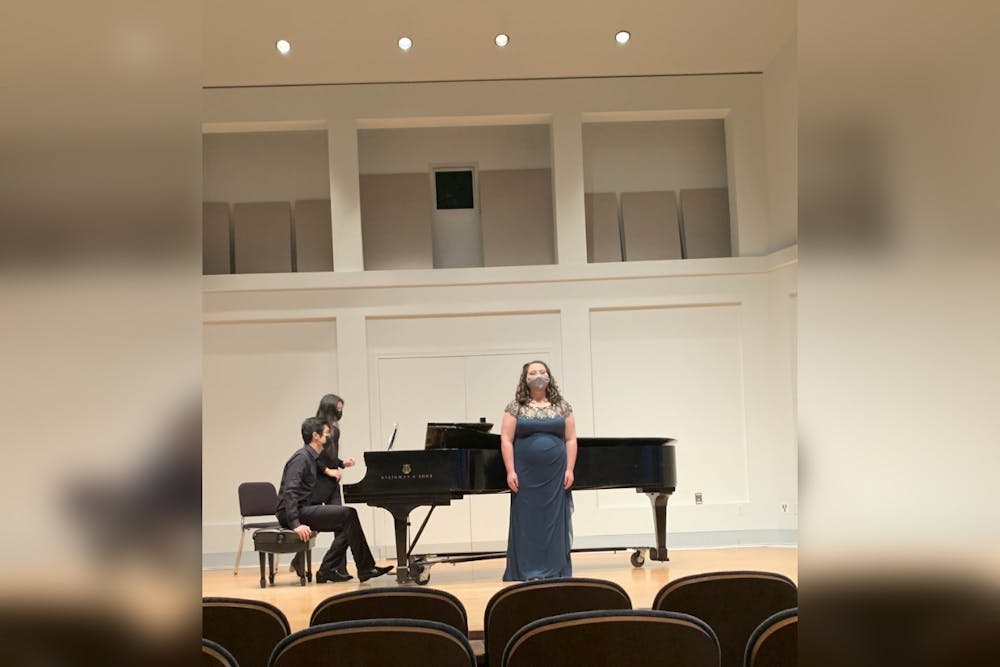Senior vocal performance major Julia Scannell spent a semester looking forward to her junior recital scheduled to happen last spring. But when the COVID-19 pandemic hit in March 2020, she was forced to postpone it until the fall. When she finally did get to perform in November, she got to do so in person — but looking out into an audience of 15 or fewer and a video camera live streaming the event.
Now she’s preparing for her senior recital April 22, but she’ll never have the chance to see her family give a standing ovation.
A year after IU shut down in-person classes due to COVID-19, the situation remains mostly the same for Jacobs School of Music students. The school moved all Jacobs student recitals, which are part of the school’s graduation requirements, to a livestream format with a limited audience, according to the school’s website. Only Jacobs students and faculty can attend in person.
The recitals are some of the biggest events in Jacobs’ degree program, Scannell said. Students work on their recital repertoire for around six months, work one-on-one with a professor for the full semester before the recital and practice outside of class. All this preparation leads to one night — the recital.
“I feel very thankful that I was still allowed to perform, but at the same time, I think it’s been an ongoing reaction,” Scannell said. “I think I speak for a lot of people when I say I felt mixed emotions.”
The lack of a live audience can be difficult to work through, Scannell said. She said she tries to remember the fact that she still has an audience, albeit not in the room with her.
Graduate student Hannah Scarborough, a cellist, agrees. Her performer diploma recital is scheduled for April 18. She’s been practicing with her roommates, also Jacobs students, but said a part of the performance is lost when playing to a camera.
“It really does make a difference to have an audience, to have people present,” Scarborough said. “I really, deeply feel that the energy in an audience gives a lot to the performance itself and really is a part of the performance, part of that physical moment and experience.”
Violinist Michael Klinberg will perform his senior recital on April 18. One frustrating disadvantage of online performances is that the video feed can lag and cut out. Klinberg said he has faced this in live streams in the past, but he doesn’t let it bother him.
“The nice thing about being the performer is that that kind of stuff, you really have to let it go,” Klinberg said. “You don’t have control over it, and you don’t know what’s going to happen. So if the livestream does start lagging, I’ll have no idea, because I’m just trying to do my best up there.”
The live streamed performance is only one part of the challenge. Throughout the semester, all three students have been working with and practicing alongside professors over Zoom. Scarborough said studying music remotely has been difficult.
“Nothing comes even remotely close to replacing in-person music-making,” Scarborough said. “Being able to hear something in person — there’s just so many things you can’t understand sonically over Zoom that you can hear in person. So it’s definitely a bit of a challenge, but I’m totally grateful that we’ve been able to make it work.”
She said she’s looking forward to returning audiences in the future, however far away it may be.
“I think everyone in the music world is just hedging our bets and crossing our fingers that we’ll be able to return to what we consider normal live performances sooner rather than later,” Scarborough said. “I think we’re just doing our best to make that happen in whatever capacity we can.”
Scannell agrees. She said one of her favorite parts about performing is making connections with people in the audience as she’s singing, and she’s ready to see that come back.
“I think it’s definitely hard because when you’re performing, you love having that recognition at the end,” Scannell said. “And I think just as humans and just as musicians, we value human connection so much.”




